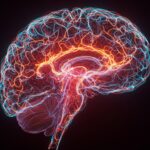A study of adults diagnosed with attention-deficit/hyperactivity disorder (ADHD) suggests that excessive mind wandering, rumination, and decreased mindfulness may mediate the link between ADHD symptoms and depression/anxiety. ADHD may predispose individuals to excessive mind wandering, rumination, and reduced mindfulness, which in turn can lead to more severe symptoms of depression and anxiety. The paper was published in Clinical Psychology & Psychotherapy.
ADHD is a neurodevelopmental disorder characterized by persistent patterns of inattention, hyperactivity, and impulsivity that interfere with daily functioning. People with ADHD often struggle to focus, follow through on tasks, or stay organized. They may act impulsively and have difficulty sitting still. Although ADHD is typically diagnosed in childhood, symptoms can persist into adulthood, albeit with a tendency to lessen over time.
Research indicates that individuals with ADHD frequently exhibit symptoms of depression and anxiety. While studying this link, researchers became interested in another symptom associated with ADHD—excessive mind wandering. Mind wandering refers to spontaneous thoughts that are unrelated to the task at hand and can divert attention, acting as a distraction.
Although mind wandering is a normal cognitive process, studies show that ADHD is associated with excessive mind wandering, which is characterized by rapid, frequent shifts in thought. This phenomenon is distracting and leads to mental restlessness and constant overactivity of the mind.
Study author Ali Kandeger and her colleagues sought to explore whether excessive mind wandering, combined with decreased mindfulness, might mediate the relationship between ADHD and anxiety/depression symptoms. Mindfulness is a mental state characterized by non-judgmental awareness of one’s thoughts, feelings, and experiences in the present moment. Some people naturally tend to be more mindful, a trait known as trait mindfulness.
The study included 159 adults with ADHD who were admitted to the Adult Neurodevelopmental Disorder Clinic at Selçuk University, 57% of whom were women. Of the participants, 21% had a history of substance use.
They completed assessments of ADHD symptom severity (using the Adult ADHD Severity Rating Scale), anxiety and depression (using the Hospital Anxiety Depression Scale), proneness to excessive mind wandering (measured by the Mind Excessively Wandering Scale), rumination (using the Ruminative Response Scale), and mindfulness (assessed by the Freiburg Mindfulness Inventory). Rumination is the repetitive and passive focus on negative thoughts or distressing situations, often resulting in prolonged emotional distress and difficulty moving forward.
The results showed that individuals with more severe ADHD symptoms also tended to have more severe symptoms of depression and anxiety, a greater tendency toward excessive mind wandering, a higher propensity for rumination, and lower trait mindfulness.
The researchers tested a statistical model proposing that ADHD symptoms lead to more excessive mind wandering, rumination, and lower mindfulness, which in turn exacerbate depression and anxiety symptoms. Their findings indicated that this pattern of relationships is plausible and that these characteristics may fully explain the link between ADHD and depression/anxiety.
“Our study unveiled a positive association between ADHD symptoms and anxiety/depression severity mediated by increased EMW [excessive mind wandering], rumination, and decreased trait mindfulness in adults with ADHD. Our findings highlight promising specific targets (e.g., EMW, rumination) in the treatment of comorbid conditions such as anxiety and depression as well as the importance of treatment of core symptoms in adults with ADHD.”, study authors concluded.
The study contributes to the scientific understanding of the links between ADHD and anxiety/depression. However, it should be noted that the design of the study does not allow any definitive cause-and-effect inferences to be derived from the results.
The paper, “Excessive mind wandering, rumination, and mindfulness mediate the relationship between ADHD symptoms and anxiety and depression in adults with ADHD,” was authored by Ali Kandeger, Şerife Odabas Ünal, Muhammed Tugrul Ergün, and Emine Yavuz Ataslar.




